"I came away each day feeling starstruck and inspired."
Kennedy JensenJazz, Vampires, and Patient Preferences
Dartmouth's First-Ever Health Care Foundations Offers a Humanistic Approach to Training Future Healthcare Leaders
Jazz, vampires, and participatory photography are not traditionally part of undergraduate healthcare studies. But, the aspiring healthcare leaders who attended the first Dartmouth’s Health Care Foundations summer intensive are not interested in traditional approaches. Over the course of an intensive week, faculty and clinical experts guided students through a week of exploring how the humanities can offer new perspectives and strategies for improving patient care and creating a generation of resilient, creative, and compassionate healthcare professionals.
"To achieve real transformation in healthcare, our future leaders are going to have to be able to think holistically about science and the humanities. We designed Foundations to support students to think critically and creatively about healthcare," says Director of Professional Education Manish K. Mishra, MD, MPH.
See highlights from the week below to learn more about what brought 40 future healthcare leaders to Dartmouth's campus July 9-13 for the start of something big.
Day 1 Topics - Interdisciplinary Approaches to Healthcare; Principles of Addiction; Lived Experiences of Addiction
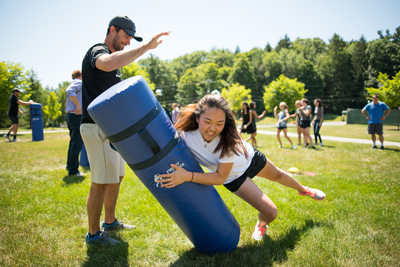 Co-Directors Mishra and Elizabeth Carpenter-Song, PhD, kicked off the week with an interactive exercise in which students worked collaboratively to describe “healthcare” in one word. Later in the morning, Alex Magleby, '00, former Dartmouth rugby captain and head coach of the USA Olympic Rugby team, used a tackling exercise to illustrate important lessons for future healthcare professionals. Magleby discussed how team dynamics on the rugby field can provide important lessons for students and healthcare professionals about giving and receiving feedback, productive responses to setbacks, and learning to support others. The day ended powerfully with a patient’s own story of heroin addiction, as students explored the physiological processes and lived experiences of addiction.
Co-Directors Mishra and Elizabeth Carpenter-Song, PhD, kicked off the week with an interactive exercise in which students worked collaboratively to describe “healthcare” in one word. Later in the morning, Alex Magleby, '00, former Dartmouth rugby captain and head coach of the USA Olympic Rugby team, used a tackling exercise to illustrate important lessons for future healthcare professionals. Magleby discussed how team dynamics on the rugby field can provide important lessons for students and healthcare professionals about giving and receiving feedback, productive responses to setbacks, and learning to support others. The day ended powerfully with a patient’s own story of heroin addiction, as students explored the physiological processes and lived experiences of addiction.
Day 2 Topics - Faith and Care in Harlem; What is an Opiate?; Patient Preferences Guiding Care; Managing Addiction in the Emergency Room
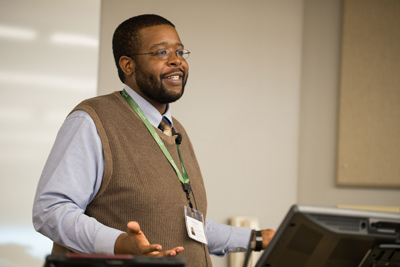 On the second day of the intensive, Vaughn A. Booker, PhD, assistant professor of religion and African and African American studies, led a session on the work of jazz legend Mary Lou Williams who created the Bel Canto Foundation to help musicians suffering from substance abuse return to performing. Booker’s scholarship illuminates how cultural creativity can be an important component of practices of care, comfort, and healing for marginalized communities. The day ended with emergency department physician, Matthew Babineau’s, MD, unflinching insights into the lived realities of providing emergency care to patients with opioid addiction.
On the second day of the intensive, Vaughn A. Booker, PhD, assistant professor of religion and African and African American studies, led a session on the work of jazz legend Mary Lou Williams who created the Bel Canto Foundation to help musicians suffering from substance abuse return to performing. Booker’s scholarship illuminates how cultural creativity can be an important component of practices of care, comfort, and healing for marginalized communities. The day ended with emergency department physician, Matthew Babineau’s, MD, unflinching insights into the lived realities of providing emergency care to patients with opioid addiction.
I now see that change [in healthcare] can begin with one person. A doctor can take the time to listen to a patient's narrative and combat restrictive cultural norms of biomedicine. A healthcare provider can be an advocate for a patient in a swarm of medical jargon. A single person can note an injustice embedded in the system and be the beginning of a coalition of good to combat it." -- Minda Liu, student
Day 3 Topics - Re-thinking Opiates in a Global Context; Music and Medicine; Culture of Biomedicine and Marginalized Populations; Medical School and MPH Admissions Panel
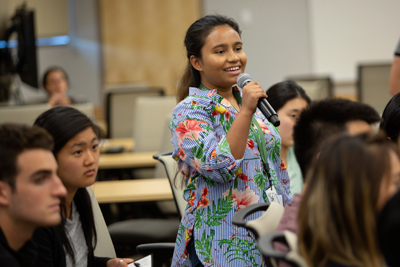 Students connected via Skype with Smriti Rana, the program director for Pallium India, and M.R. Rajagopal, MD, widely considered to be the ‘father’ of palliative care in India, to discuss how Pallium is working to improve access to pain-relieving medicines in India. Rajagopal challenged students to attend to the “global burden of suffering” in their future careers in healthcare. Later that day, William Cheng, PhD, associate professor of music, made connections between music and medicine in advocating for continued self-reflection and humility among celebrated musicians and physicians. Medical anthropologist Elizabeth Carpenter-Song, PhD, gave a detailed account of healthcare experiences among marginalized rural populations to provide insight into how the culture of biomedicine may contribute to the persistence of health disparities.
Students connected via Skype with Smriti Rana, the program director for Pallium India, and M.R. Rajagopal, MD, widely considered to be the ‘father’ of palliative care in India, to discuss how Pallium is working to improve access to pain-relieving medicines in India. Rajagopal challenged students to attend to the “global burden of suffering” in their future careers in healthcare. Later that day, William Cheng, PhD, associate professor of music, made connections between music and medicine in advocating for continued self-reflection and humility among celebrated musicians and physicians. Medical anthropologist Elizabeth Carpenter-Song, PhD, gave a detailed account of healthcare experiences among marginalized rural populations to provide insight into how the culture of biomedicine may contribute to the persistence of health disparities.
Day 4 Topics - Introduction to Photovoice; Learning about Addiction by Studying the History of the Vampire
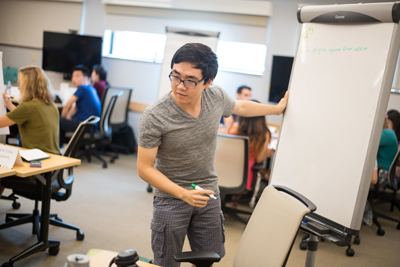 Associate Professor Anna Adachi-Mejia, PhD, Director of the Health Promotion Research Center at Dartmouth, introduced students to the photovoice technique, which uses photos to express one's viewpoints about a given topic. Students then explored the Dartmouth campus and took photos which helped them develop their argument for reducing stigma in public health practice. That afternoon, Mary Flanagan, PhD, the Sherman Fairchild Distinguished Professor in Digital Humanities at Dartmouth, talked about how the image of the vampire—a historically marginalized creature that behaves in conflicted ways—provides a metaphor for studying addiction. The discussion focused on how critical reading and character development can help healthcare professionals to respond compassionately to those who are suffering.
Associate Professor Anna Adachi-Mejia, PhD, Director of the Health Promotion Research Center at Dartmouth, introduced students to the photovoice technique, which uses photos to express one's viewpoints about a given topic. Students then explored the Dartmouth campus and took photos which helped them develop their argument for reducing stigma in public health practice. That afternoon, Mary Flanagan, PhD, the Sherman Fairchild Distinguished Professor in Digital Humanities at Dartmouth, talked about how the image of the vampire—a historically marginalized creature that behaves in conflicted ways—provides a metaphor for studying addiction. The discussion focused on how critical reading and character development can help healthcare professionals to respond compassionately to those who are suffering.
Day 5 Topics - Healthcare is “Broken;” Disrupting Education in Order to Create Patient-Centered
Community Services and Social Capital
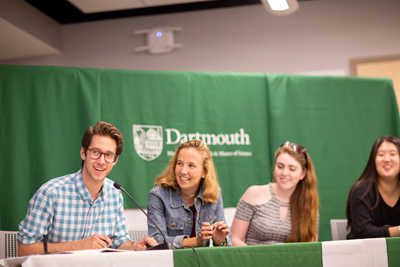 The last day built on the core themes of the week to identify ways in which contemporary global healthcare is “broken” and to develop strategies for addressing urgent challenges. Students connected via Skype with Dr. Agnes Binagwaho, MD, PhD, former Minister of Health of Rwanda and the vice chancellor for the University of Global Health Equity in Kigali, Rwanda. Binagwaho invited students to model their advocacy on her renowned work creating patient-centered services through community engagement and participation. In the afternoon, students presented their photovoice projects and celebrated the culmination of the week.
The last day built on the core themes of the week to identify ways in which contemporary global healthcare is “broken” and to develop strategies for addressing urgent challenges. Students connected via Skype with Dr. Agnes Binagwaho, MD, PhD, former Minister of Health of Rwanda and the vice chancellor for the University of Global Health Equity in Kigali, Rwanda. Binagwaho invited students to model their advocacy on her renowned work creating patient-centered services through community engagement and participation. In the afternoon, students presented their photovoice projects and celebrated the culmination of the week.
This program took a radical approach to changing future physicians' approaches to medicine. We walked away with concrete examples of behaviors we can act upon and model to undermine power differentials and improve future patient care." -- Kennedy Jensen, student
POSTED 9/17/2018 AT 03:50 PM IN #foundations

